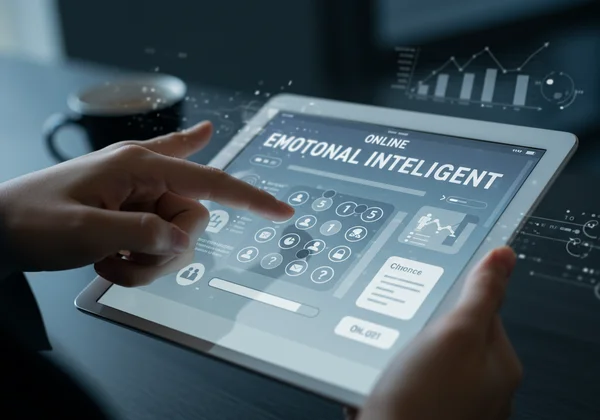ทดสอบความฉลาดทางอารมณ์ของคุณ: เพิ่มประสิทธิภาพการทำงานของทีม
September 29, 2025 | By Phoebe Chandler
ในภูมิทัศน์การแข่งขันในปัจจุบัน อะไรคือสิ่งที่แยกทีมที่ดีออกจากทีมที่ยอดเยี่ยม? ไม่ใช่แค่ทักษะทางเทคนิคหรือไอคิวเท่านั้น สิ่งที่ทำให้แตกต่างอย่างแท้จริงคือความฉลาดทางอารมณ์—ความสามารถในการเข้าใจ ใช้ และจัดการอารมณ์ในเชิงบวกเพื่อคลายความเครียด สื่อสารอย่างมีประสิทธิภาพ เอาใจใส่ผู้อื่น เอาชนะความท้าทาย และลดความขัดแย้ง ในฐานะผู้นำหรือผู้เชี่ยวชาญด้านทรัพยากรบุคคล คุณมักจะถามตัวเองอยู่เสมอว่า: มีแบบทดสอบความฉลาดทางอารมณ์ ที่สามารถปลดล็อกศักยภาพที่แท้จริงของทีมได้หรือไม่? ใช่ แบบทดสอบความฉลาดทางอารมณ์สามารถปลดล็อกศักยภาพที่แท้จริงของทีมได้อย่างแท้จริง และการนำไปใช้ประโยชน์คือก้าวแรกเชิงกลยุทธ์ในการสร้างทีมที่มีความยืดหยุ่น ทำงานร่วมกันได้ดี และมีประสิทธิภาพสูง
คู่มือนี้จะอธิบายให้คุณทราบว่าทำไม EQ จึงเป็นองค์ประกอบที่ขาดไม่ได้สำหรับทีมยุคใหม่ วิธีการนำการประเมินมาใช้เชิงกลยุทธ์ และวิธีแปลงผลลัพธ์เหล่านั้นให้เป็นการเติบโตที่จับต้องได้ ถึงเวลาที่จะก้าวข้ามการคาดเดาและเริ่มตัดสินใจโดยใช้ข้อมูลเกี่ยวกับการพัฒนาทีมของคุณ คุณสามารถเริ่มต้นการเดินทางแห่งการเปลี่ยนแปลงนี้ได้ตั้งแต่วันนี้โดยสนับสนุนให้ทีมของคุณ เริ่มต้นการประเมินฟรี

ทำไมความฉลาดทางอารมณ์จึงสำคัญต่อการพัฒนาทีม
ก่อนที่จะนำเครื่องมือใดๆ มาใช้ สิ่งสำคัญคือต้องเข้าใจประโยชน์หลัก ความฉลาดทางอารมณ์สูงไม่ใช่ "ทักษะด้านอารมณ์และสังคม" แต่เป็นองค์ประกอบพื้นฐานของสถานที่ทำงานที่ประสบความสำเร็จ เมื่อทีมมีความฉลาดทางอารมณ์โดยรวมสูง ผลกระทบเชิงบวกจะส่งผลไปทั่วทุกด้านของการดำเนินงาน สร้างความได้เปรียบในการแข่งขันที่ทรงพลัง ทีมที่เข้าใจตัวเองสามารถเอาชนะความท้าทายใดๆ ก็ได้
เพิ่มประสิทธิภาพการสื่อสารและการทำงานร่วมกันผ่าน EQ
การสื่อสารในทีม ที่มีประสิทธิภาพคือเส้นเลือดใหญ่ของโครงการที่ประสบความสำเร็จ ทีมที่มี EQ สูงจะโดดเด่นในด้านนี้ เนื่องจากสมาชิกฝึกฝนการตระหนักรู้ในตนเองและการเอาใจใส่ผู้อื่น พวกเขาสามารถสื่อสารความคิดได้อย่างชัดเจนโดยไม่ก่อให้เกิดการป้องกันตัว และตั้งใจฟังเพื่อทำความเข้าใจมุมมองของเพื่อนร่วมงาน สิ่งนี้ช่วยลดความเข้าใจผิด เร่งการตัดสินใจ และส่งเสริมสภาพแวดล้อมที่ความคิดสร้างสรรค์สามารถเติบโตได้ เมื่อสมาชิกในทีมรู้สึกว่าได้รับการรับฟังและเคารพ การทำงานร่วมกันจะเปลี่ยนจากข้อกำหนดไปสู่กระบวนการที่เป็นธรรมชาติและสร้างสรรค์

สร้างความยืดหยุ่นและจัดการความขัดแย้งในที่ทำงาน
ความขัดแย้งและความล้มเหลวเป็นสิ่งที่หลีกเลี่ยงไม่ได้ สิ่งที่กำหนดทีมที่แข็งแกร่งคือความสามารถในการจัดการกับความท้าทายเหล่านี้อย่างสร้างสรรค์ บุคคลที่มีความฉลาดทางอารมณ์จะมีความพร้อมที่ดีกว่าในการจัดการความเครียดและการตอบสนองทางอารมณ์ของตนเองในสถานการณ์ที่มีแรงกดดันสูง ทักษะนี้มีความสำคัญต่อการแก้ไข ความขัดแย้งในที่ทำงาน แทนที่จะตอบสนองอย่างหุนหันพลันแล่น พวกเขาสามารถเข้าหาความขัดแย้งด้วยแนวคิดในการแก้ปัญหา เพื่อแสวงหาทางออกที่เป็นประโยชน์ร่วมกัน ความยืดหยุ่นนี้เปลี่ยนวิกฤตที่อาจเกิดขึ้นให้เป็นโอกาสในการเติบโตและเสริมสร้างความสามัคคีในทีม
ส่งเสริมวัฒนธรรมทีมที่มีพลังและประสิทธิผล
การสร้างวัฒนธรรมทีมที่มีประสิทธิผลคือเป้าหมายสูงสุด ซึ่งสมาชิกทุกคนรู้สึกมีคุณค่า มีแรงจูงใจ และมีพลัง ความฉลาดทางอารมณ์เป็นปัจจัยเร่งให้เกิดการเปลี่ยนแปลงนี้ ผู้นำที่มี EQ สูงจะสร้างแรงบันดาลใจให้เกิดความไว้วางใจและความภักดี ในขณะที่สมาชิกในทีมที่มี EQ สูงจะช่วยสร้างสภาพแวดล้อมที่ปลอดภัยทางจิตใจ บรรยากาศเชิงบวกนี้ช่วยเพิ่มขวัญกำลังใจ เพิ่มการมีส่วนร่วมของพนักงาน และส่งผลโดยตรงต่อผลกำไรผ่านประสิทธิภาพการทำงานที่สูงขึ้นและอัตราการลาออกที่ลดลง เครื่องมือ EQ ออนไลน์ ง่ายๆ สามารถเป็นจุดเริ่มต้นสำหรับการเปลี่ยนแปลงทางวัฒนธรรมนี้ได้
การนำไปใช้เชิงกลยุทธ์: การใช้แบบทดสอบ EQ ในองค์กรของคุณ
การทำความเข้าใจ "ทำไม" คือขั้นตอนแรก; "อย่างไร" คือจุดที่กลยุทธ์เข้ามามีบทบาท การบูรณาการแบบทดสอบความฉลาดทางอารมณ์เข้ากับองค์กรของคุณต้องใช้วิธีการที่รอบคอบเพื่อเพิ่มผลกระทบสูงสุดและสร้างการยอมรับและการมีส่วนร่วมจากทีม ไม่ใช่เรื่องของการติดป้ายชื่อบุคคล แต่เป็นการสร้างภาษาร่วมและกรอบการทำงานสำหรับการเติบโต
การเลือกเครื่องมือประเมินความฉลาดทางอารมณ์ที่เหมาะสม
การประเมินไม่ได้ถูกสร้างขึ้นมาเท่ากันทั้งหมด หลีกเลี่ยงแบบทดสอบง่ายๆ และมองหาเครื่องมือที่มีพื้นฐานมาจากแนวคิดทางจิตวิทยาที่ได้รับการยอมรับ แบบทดสอบ ความฉลาดทางอารมณ์ ที่แข็งแกร่งควรให้มากกว่าแค่คะแนน แต่ควรให้ข้อมูลเชิงลึกที่นำไปปฏิบัติได้ มองหาแพลตฟอร์มที่นำเสนอทั้งจุดเริ่มต้นที่รวดเร็วและเข้าถึงได้ (เช่น การประเมินเบื้องต้นฟรี) และตัวเลือกสำหรับรายงานเชิงลึกส่วนบุคคล ความยืดหยุ่นนี้ ซึ่งจัดทำโดย แบบประเมินความฉลาดทางอารมณ์ ช่วยให้คุณสามารถตอบสนองความต้องการที่แตกต่างกัน ตั้งแต่การค้นพบตนเองของแต่ละบุคคลไปจนถึงเวิร์กช็อปทีมที่ครอบคลุม

การบูรณาการการประเมิน EQ เข้ากับโปรแกรม HR และความเป็นผู้นำ
แบบทดสอบความฉลาดทางอารมณ์สำหรับพนักงาน ไม่ควรเป็นเหตุการณ์ที่เกิดขึ้นเพียงครั้งเดียว เพื่อให้เกิดการเปลี่ยนแปลงที่ยั่งยืน ให้ผนวกแบบทดสอบนี้เข้ากับกรอบการบริหารจัดการความสามารถและโปรแกรมพัฒนาความเป็นผู้นำที่มีอยู่ของคุณ ใช้เป็นจุดเริ่มต้นในการสนทนาระหว่างการปฐมนิเทศเพื่อกำหนดทิศทางของการตระหนักรู้ในตนเองตั้งแต่วันแรก รวมเข้ากับโปรแกรมฝึกอบรมความเป็นผู้นำเพื่อช่วยให้ผู้นำหน้าใหม่เข้าใจผลกระทบของตนเองต่อผู้อื่น นอกจากนี้ยังสามารถเป็นเครื่องมือที่มีคุณค่าในการประเมินผลการปฏิบัติงาน โดยเปลี่ยนจุดสนใจจากเพียง สิ่งที่ ทำสำเร็จไปสู่ วิธีการ ทำสำเร็จ ซึ่งส่งเสริมการเติบโตในทักษะด้านอารมณ์และสังคมที่สำคัญ
การรับรองการใช้งานอย่างมีจริยธรรมและการเพิ่มการมีส่วนร่วมของพนักงานสูงสุด
ความไว้วางใจเป็นสิ่งสำคัญที่สุด เมื่อแนะนำการประเมินใดๆ สิ่งสำคัญคือต้องสื่อสารวัตถุประสงค์อย่างชัดเจน เน้นย้ำว่าเป้าหมายคือการพัฒนา ไม่ใช่การวินิจฉัยหรือการลงโทษ ให้ความมั่นใจกับทีมของคุณว่าผลลัพธ์จะถูกเก็บเป็นความลับและมีวัตถุประสงค์เพื่อการเติบโตส่วนบุคคลและทางอาชีพ กำหนดกรอบการประเมินเป็นการลงทุนในความสำเร็จของพวกเขา เมื่อพนักงานมองว่าเป็นเครื่องมือสนับสนุนที่จะช่วยให้พวกเขาประสบความสำเร็จ พวกเขามักจะเข้าร่วมกระบวนการอย่างซื่อสัตย์และกระตือรือร้นมากขึ้น
การแปลงผลลัพธ์แบบทดสอบ EQ ให้เป็นการเติบโตของทีมที่นำไปปฏิบัติได้จริง
คุณค่าที่แท้จริงของ การประเมินความฉลาดทางอารมณ์ จะปรากฏขึ้นหลังจากที่ได้ผลลัพธ์แล้ว ข้อมูลให้แผนที่นำทาง บทบาทของคุณในฐานะผู้นำคือการนำทางทีมในการเดินทาง นี่คือจุดที่ข้อมูลเชิงลึกถูกเปลี่ยนเป็นพฤติกรรมที่ดีขึ้น ความสัมพันธ์ที่แข็งแกร่งขึ้น และผลลัพธ์ทางธุรกิจที่ดีขึ้น
การพัฒนาทักษะ EQ ส่วนบุคคลภายในบริบทของทีม
รายงานเบื้องต้นจากแบบทดสอบ EQ จะให้จุดเริ่มต้นสำหรับ การตระหนักรู้ในตนเอง แก่สมาชิกในทีมแต่ละคน สนับสนุนให้พวกเขาไตร่ตรองผลลัพธ์ส่วนบุคคล—จุดแข็งของพวกเขาคืออะไร และโอกาสในการเติบโตของพวกเขาอยู่ตรงไหน? แบบประเมินที่มีคุณภาพจะให้คำแนะนำที่เฉพาะเจาะจงและนำไปปฏิบัติได้ ผู้นำสามารถสนับสนุนสิ่งนี้ได้โดยการอำนวยความสะดวกในการฝึกสอนแบบตัวต่อตัวเพื่อช่วยให้แต่ละบุคคลสร้างแผนพัฒนาส่วนบุคคลที่มุ่งเน้นไปที่ด้านต่างๆ เช่น การจัดการความเครียด การเอาใจใส่ผู้อื่น หรือการสื่อสารเชิงรุก
การอำนวยความสะดวกในการจัดเวิร์กช็อปทีมเพื่อความฉลาดทางอารมณ์โดยรวม
ในขณะที่การเติบโตของแต่ละบุคคลมีความสำคัญ แต่ผลลัพธ์ที่ยอดเยี่ยมจะเกิดขึ้นเมื่อคุณยกระดับ EQ โดยรวมของทีม ใช้ผลลัพธ์โดยรวมของทีมที่รวบรวมและไม่ระบุตัวตนเพื่ออำนวยความสะดวกในการจัดเวิร์กช็อป การพูดคุยเกี่ยวกับจุดแข็งและความท้าทายของทีมโดยรวมอาจทรงพลังอย่างยิ่ง ตัวอย่างเช่น หากข้อมูลบ่งชี้ว่าทีมประสบปัญหาในการแก้ไขความขัดแย้ง คุณสามารถจัดการฝึกอบรมที่มุ่งเน้นทักษะเฉพาะนั้นได้ เซสชันเหล่านี้สร้างความปลอดภัยทางจิตใจและเสริมสร้างแนวคิดที่ว่าความฉลาดทางอารมณ์เป็นความรับผิดชอบร่วมกัน ซึ่งเสริมสร้าง ความสามัคคีในทีม
การวัดความก้าวหน้า: การติดตามการเดินทาง EQ ของทีมคุณ
การปรับปรุงความฉลาดทางอารมณ์คือการเดินทางที่ต่อเนื่อง ไม่ใช่จุดหมายปลายทาง เพื่อรักษาโมเมนตัมและแสดง ROI ให้กำหนดแผนสำหรับการติดตามความคืบหน้า สนับสนุนให้สมาชิกในทีมทำ แบบประเมิน EQ ซ้ำทุก 6 ถึง 12 เดือน สิ่งนี้ช่วยให้ทั้งบุคคลและทีมโดยรวมเห็นการเติบโตที่จับต้องได้เมื่อเวลาผ่านไป การเฉลิมฉลองการปรับปรุงเหล่านี้จะตอกย้ำคุณค่าของความคิดริเริ่มและทำให้ทุกคนมีส่วนร่วมในการพัฒนาอย่างต่อเนื่อง

ยกระดับทีมของคุณ: เริ่มต้นการเดินทางสู่ความฉลาดทางอารมณ์ของพวกเขาได้แล้ววันนี้
การลงทุนในความฉลาดทางอารมณ์ของทีมคือหนึ่งในการตัดสินใจที่ทรงพลังที่สุดที่ผู้นำสามารถทำได้ เป็นการลงทุนที่ให้ผลตอบแทนที่คุ้มค่าในรูปแบบของการสื่อสารที่ดีขึ้น ความยืดหยุ่นที่แข็งแกร่งขึ้น และวัฒนธรรมเชิงบวกที่มีประสิทธิภาพสูง ด้วยการเปลี่ยนจากแนวคิดนามธรรมไปสู่การดำเนินการที่เป็นรูปธรรมด้วย แบบทดสอบความฉลาดทางอารมณ์ (EQ) ที่น่าเชื่อถือ คุณจะมอบเครื่องมือที่ทีมต้องการเพื่อทำความเข้าใจตนเองและผู้อื่นได้ดีขึ้น
อย่ารอให้การสื่อสารล้มเหลวหรือความขัดแย้งบานปลาย จงดำเนินการเชิงรุก มอบของขวัญแห่งการตระหนักรู้ในตนเองให้ทีมของคุณ และเริ่มสร้างองค์กรที่เชื่อมโยงกัน มีประสิทธิภาพ และมีความฉลาดทางอารมณ์มากขึ้นตั้งแต่วันนี้
พร้อมที่จะปลูกฝังองค์กรที่เชื่อมโยงกัน มีประสิทธิภาพ และยืดหยุ่นมากขึ้นแล้วหรือยัง? นำทีมของคุณไป ค้นพบผลลัพธ์ความฉลาดทางอารมณ์ของพวกเขา และก้าวแรกแห่งการเปลี่ยนแปลง
คำถามที่พบบ่อยเกี่ยวกับแบบทดสอบความฉลาดทางอารมณ์สำหรับทีม
แบบทดสอบความฉลาดทางอารมณ์สำหรับพนักงานคืออะไร?
แบบทดสอบความฉลาดทางอารมณ์สำหรับพนักงาน คือเครื่องมือที่ออกแบบมาเพื่อวัดความสามารถของบุคคลในการรับรู้ เข้าใจ และจัดการอารมณ์ของตนเองและผู้อื่นในบริบทการทำงาน ซึ่งแตกต่างจากแบบทดสอบทักษะทางเทคนิค โดยจะประเมินความสามารถต่างๆ เช่น การตระหนักรู้ในตนเอง การจัดการตนเอง การเอาใจใส่ผู้อื่น และทักษะทางสังคม มันให้ข้อมูลเชิงลึกที่มีคุณค่าซึ่งสามารถนำไปใช้สำหรับการพัฒนาส่วนบุคคล การฝึกอบรมความเป็นผู้นำ และการปรับปรุงพลวัตของทีม
ผู้นำสามารถวัดความฉลาดทางอารมณ์ของทีมได้อย่างมีประสิทธิภาพได้อย่างไร?
ผู้นำสามารถวัดความฉลาดทางอารมณ์ของทีมได้โดยให้สมาชิกแต่ละคนทำ แบบทดสอบความฉลาดทางอารมณ์ ที่เป็นความลับและได้มาตรฐาน ในขณะที่คะแนนส่วนบุคคลมีไว้สำหรับการพัฒนาส่วนบุคคล ผู้นำสามารถดูข้อมูลรวมที่ไม่ระบุตัวตนเพื่อระบุจุดแข็งและจุดอ่อนโดยรวมได้ ข้อมูลนี้เมื่อรวมกับข้อเสนอแนะจากการสังเกตและตัวชี้วัดประสิทธิภาพของทีม จะให้มุมมองที่ครอบคลุมเกี่ยวกับ EQ โดยรวมของทีม
คะแนนที่ดีในการทดสอบความฉลาดทางอารมณ์สำหรับมืออาชีพคือเท่าใด?
ไม่มีคะแนน "ดี" สากล เนื่องจากบทบาทที่แตกต่างกันอาจต้องการทักษะทางอารมณ์ที่แตกต่างกัน ประเด็นสำคัญควรอยู่ที่การทำความเข้าใจความสมดุลระหว่างด้านต่างๆ ของ EQ มากกว่าตัวเลขสัมบูรณ์ เป้าหมายของการประเมินเช่นที่ EmotionalIntelligenceTest.org คือการระบุพื้นที่สำหรับการเติบโต ไม่ใช่การให้เกรดผ่านหรือไม่ผ่าน ผลลัพธ์ที่ "ดี" คือความมุ่งมั่นที่จะพัฒนาด้านที่ต้องพัฒนา
การประเมินความฉลาดทางอารมณ์มักใช้เวลานานเท่าใดสำหรับสมาชิกในทีม?
แบบประเมินความฉลาดทางอารมณ์ ออนไลน์สมัยใหม่ส่วนใหญ่ได้รับการออกแบบมาให้มีประสิทธิภาพและใช้งานง่าย แบบทดสอบคุณภาพสูงและครอบคลุม เช่น การประเมิน 20 คำถามของเรา โดยทั่วไปจะใช้เวลาประมาณ 10-15 นาที ทำให้ง่ายต่อการรวมเข้ากับวันทำงานที่ยุ่งวุ่นวายโดยไม่ก่อให้เกิดผลกระทบที่สำคัญ
กลยุทธ์ที่ดีที่สุดในการปรับปรุงความฉลาดทางอารมณ์ในทีมคืออะไร?
กลยุทธ์ที่ดีที่สุดเกี่ยวข้องกับแนวทางแบบองค์รวม เริ่มต้นด้วย แบบประเมิน EQ พื้นฐานเพื่อสร้างการตระหนักรู้ ตามด้วยเวิร์กช็อปที่มุ่งเน้นทักษะเฉพาะ เช่น การฟังอย่างตั้งใจหรือการแก้ไขความขัดแย้ง สนับสนุนการโค้ชและการเป็นพี่เลี้ยงโดยเพื่อนร่วมงาน และเป็นแบบอย่างโดยแสดงความฉลาดทางอารมณ์สูงในการปฏิสัมพันธ์ของคุณเอง สุดท้าย ให้ EQ เป็นหัวข้อสนทนาปกติในการประชุมทีมและการพูดคุยแบบตัวต่อตัวเพื่อหลอมรวม EQ เข้าเป็นส่วนหนึ่งของวัฒนธรรมองค์กร